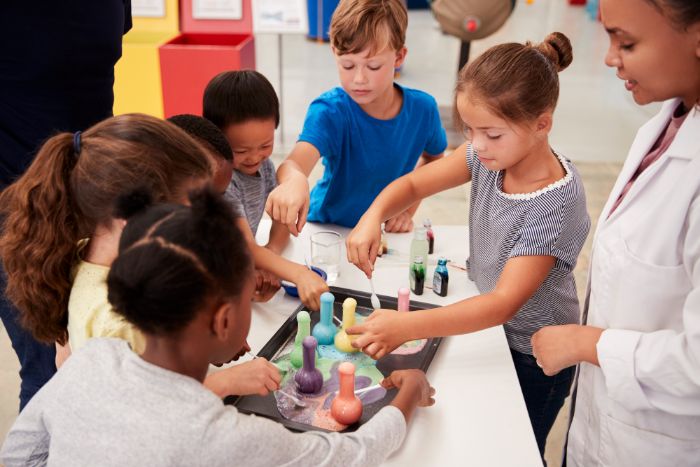Children are naturally curious beings, and their fascination with the world around them often leads to an interest in science. Encouraging and nurturing this interest in science projects can profoundly impact a child’s development. Not only does it stimulate their intellectual growth, but it also instills valuable skills like critical thinking, problem-solving, and creativity. This article will explore various ways to support and foster a child’s enthusiasm for science projects.

Create a Science-Friendly Environment
An essential step in encouraging a child’s interest in science is to create an environment that fosters curiosity. Fill your home with books, magazines, science lab equipment, and educational resources related to science. Encourage questions and engage in discussions about scientific topics. Consider setting up a small science corner with tools, microscopes, and lab supplies for hands-on exploration. Ensure your child can access various educational resources, such as books, documentaries, and websites. Libraries and online platforms offer a wealth of information on various scientific topics. Encourage your child to explore these resources to expand their knowledge.
Support Their Interests
Pay attention to your child’s interests and help them explore topics that intrigue them. Invest in a telescope and stargazing books if they are interested in astronomy. If they are fascinated by chemistry, provide safe and age-appropriate chemistry kits. Tailoring resources to their interests will keep them engaged and motivated. When your child completes a science project or achieves a scientific milestone, celebrate their accomplishments. Praise their efforts and highlight the value of their discoveries. Positive reinforcement can motivate them to continue exploring the world of science.
Encourage Hands-On Learning
Hands-on experiments and activities are a fantastic way to make science come alive for kids. Perform simple experiments at home, such as creating a volcano with baking soda and vinegar or growing crystals. These activities provide immediate feedback and make learning fun. Help your child understand the real-world applications of science. Discuss how scientific discoveries have improved our lives, from medical breakthroughs to technological advancements. Show them that their interest in science can lead to meaningful contributions to society.

Explore STEM Programs and Classes
Many schools and organizations offer STEM (Science, Technology, Engineering, and Mathematics) programs and classes for children. These programs provide structured learning experiences and opportunities to work on science projects with peers. Consider enrolling your child in such programs to enhance their scientific knowledge and skills. If possible, arrange for your child to meet and interact with professionals in STEM fields. These interactions can provide valuable insights and inspiration. Attend science-related events, lectures, or career fairs where your child can engage with scientists, engineers, and researchers.
Visit Science Museums and Exhibitions
Science museums and exhibitions offer immersive and interactive experiences that can ignite a child’s passion for science. Plan regular trips to local science museums or attend special science exhibitions. These outings can be both educational and entertaining for the whole family. Science fairs are also an excellent opportunity for children to showcase their scientific projects and discoveries. If your child expresses interest in participating, provide guidance and assistance throughout the process. Help them choose a project, gather materials, and practice their presentation skills.
Be a Role Model
Children often mimic the behaviors and interests of their parents or caregivers. If you show enthusiasm for science, your child is more likely to develop a similar passion. Share your scientific interests and experiences with them. Visit science museums, attend science events, and explore nature together to inspire their curiosity. Science projects can be challenging, and children may encounter setbacks. Teach them the importance of perseverance and resilience. Help them see failures as opportunities to learn and improve.
The Importance of Science Education for Kids
Science education is a fundamental aspect of a child’s overall learning journey. It gives them the tools to understand and interact with the world, fostering a sense of wonder and curiosity. Science projects require children to think critically. They must ask questions, formulate hypotheses, conduct experiments, and analyze results. This process promotes logical reasoning and problem-solving skills.
Children are naturally curious, and science projects allow them to explore their interests and seek answers to their questions. This curiosity is the driving force behind scientific inquiry. Science projects often require creativity to design experiments, develop hypotheses, and present findings. Encouraging creativity helps children think outside the box and develop innovative solutions to problems.

Supporting and nurturing a child’s interest in science projects is a rewarding journey that can impact their intellectual and personal development. By creating a science-friendly environment, being a role model, and providing access to resources and opportunities, you can help your child explore the wonders of the scientific world. Remember that the goal is to impart scientific knowledge and instill a lifelong love for learning and discovery. As you embark on this journey together, you’ll witness your child’s curiosity and enthusiasm for science projects flourish, paving the way for a brighter and more scientifically literate future.
